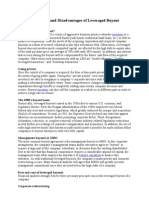Management Buy in
Management Buy in
Uploaded by
CarolCopyright:
Available Formats
Management Buy in
Management Buy in
Uploaded by
CarolOriginal Description:
Original Title
Copyright
Available Formats
Share this document
Did you find this document useful?
Is this content inappropriate?
Copyright:
Available Formats
Management Buy in
Management Buy in
Uploaded by
CarolCopyright:
Available Formats
Management Buy-In (MBI)
By WILL KENTON
What Is a Management Buy-In (MBI)?
A management buy-in (MBI) is a corporate action in which an outside manager or
management team purchases a controlling ownership stake in an outside
company and replaces its existing management team. This type of action can
occur when a company appears to be undervalued, poorly managed, or
requires succession.
KEY TAKEAWAYS:
A management buy-in (MBI) occurs when an outside manager or
management team purchases a controlling ownership stake in an outside
company and replaces its existing management team.
A company that experiences an MBI is often undervalued and experiencing
difficulties in some area.
The buyer must be careful to accurately value the target so that they do not
pay more than is necessary.
Understanding Management Buy-In (MBI)
Management buy-in is also used in a non-financial sense to refer to situations
where the support of management is sought for an idea or project. When
management "buys in," they have thrown their support behind an idea, which
would typically indicate financial resources will be allocated so that the venture
can move forward.
A management buy-in differs from a management buyout (MBO). With an MBO,
the target company's existing management purchases the company. MBOs
typically require financial resources beyond those of management, such as a
bank debt or bonds. If a significant amount of debt financing is required, the deal
is described as a leveraged buyout (LBO).
Management buy-in (MBI) is a corporate activity. In management buy-in, a
company is purchased by a manager or a management team from outside the
company. The target company is acquired by outside investors when the
company's decision-makers consider it to be underperforming, and the
company’s products could generate greater than current yields with the proposed
change in current business strategy and/or management. After the acquisition,
the buyer can replace the current board of directors of the company with their
representatives. In many cases, there is competition among buyers to purchase
a suitable business. Generally, these management teams are led by experienced
managers at the managing director level. The difference between management
buy-in and management buy-out is the position of the buyer. In the case of a
management buy-in, the buyers are external to the target company. In the case
of a management buy-out, the buyers working for the target company.
Management buy-in is an acquisition tactic that follows a process.
Company Analysis
First, the buyer conducts a market analysis on the target to gather data on its
buyers, sellers, competitors, suppliers, substitutes, products and services,
customers, the scope of business and the financials. The buyer must also know
what other companies are looking to buy the target because this will affect the
price.
The Negotiations
Based on the analysis, the buyer prepares an offer for the target company’s
owners. Both parties will negotiate the price and may reach an agreement.
The Transaction
If agreement on the price and terms are reached, the transaction will ocur based
on the local rules and regulations. Once the transaction is complete, the buyer
officially becomes the owner of the company’s management and can nominate
their representatives as the board of directors.
Possible Advantages of Management Buy-Ins (MBIs)
In many cases, companies that undego an MBI are undervalued, and the buyer
can sell the company at a higher price in the future. Also, if the current owners of
a company are unable to manage the company, an MBI is a win-win situation for
both the buyer and the seller. A new management team might have better
knowledge, contacts, and experience, which can often stimulate growth in a
company maximizing the shareholders' wealth. Lastly, current employees may
become motivated because of management changes.
Possible Disadvantages of MBIs
There is always the possibility that an MBI will not have the desired affect and the
new management team may fail to bring the required growth to the company.
Existing employees may feel demotivated by the changes. Also, the buyer may
end up paying way more than required if they estimate the value of the company
incorrectly.
You might also like
- Health Insurance Capability ModelDocument8 pagesHealth Insurance Capability ModelCapability Model100% (1)
- Background Check ProposalDocument11 pagesBackground Check ProposalOwunari Adaye-Orugbani100% (1)
- XAXA CoDocument46 pagesXAXA Conur iman qurrataini abdul rahmanNo ratings yet
- Advantages and Disadvantages of Leveraged BuyoutDocument3 pagesAdvantages and Disadvantages of Leveraged BuyoutSindy_Kusuma_N_1225No ratings yet
- Tutorial 1 Topic: Strategic Management and Strategic Competitiveness (Introduction To Strategic Management)Document7 pagesTutorial 1 Topic: Strategic Management and Strategic Competitiveness (Introduction To Strategic Management)Krishneel Anand PrasadNo ratings yet
- Entrepreneurial Motivation and CompetenciesDocument33 pagesEntrepreneurial Motivation and CompetenciesHisyammudin RoslanNo ratings yet
- Private EquityDocument21 pagesPrivate EquityKeshika WadhwaNo ratings yet
- IBM Capital StructureDocument53 pagesIBM Capital Structureyajkr0% (1)
- Business in A Changing WorldDocument39 pagesBusiness in A Changing WorldAryaNo ratings yet
- Case QuestionsDocument5 pagesCase Questionschoijin9870% (1)
- Merger and AcquisitionDocument7 pagesMerger and Acquisitionkalyani_iyer63504No ratings yet
- Theory of Capital Structure (Assigement - 1) .Document7 pagesTheory of Capital Structure (Assigement - 1) .Ritesh Singh RathoreNo ratings yet
- Quizlet Test Dividend PDFDocument3 pagesQuizlet Test Dividend PDFAPRATIM BHUIYANNo ratings yet
- Digital Transformation and Its Impact On PDFDocument30 pagesDigital Transformation and Its Impact On PDFKashif ManzoorNo ratings yet
- The Reporting Entity and Consolidated Financial StatementsDocument34 pagesThe Reporting Entity and Consolidated Financial StatementsNovia Niki PertiwiNo ratings yet
- Retail Life CycleDocument9 pagesRetail Life Cyclevermaamanverma0% (1)
- Essentials of Strategic Management Chapter 3Document51 pagesEssentials of Strategic Management Chapter 3mcmadieNo ratings yet
- Trust and Consequences: A Survey of Berkshire Hathaway Operating ManagersDocument5 pagesTrust and Consequences: A Survey of Berkshire Hathaway Operating ManagersHaridas HaldarNo ratings yet
- Ratio Analysis of The Annual Report On Standard BankDocument15 pagesRatio Analysis of The Annual Report On Standard BankShopno Konna Sarah80% (5)
- AFM Unit 4Document26 pagesAFM Unit 4harsh singhNo ratings yet
- Financial EngineeringDocument18 pagesFinancial Engineeringtanay-mehta-3589100% (1)
- Ma Lbo JVDocument25 pagesMa Lbo JVMansi ShishodiaNo ratings yet
- Week 7 7 Ps Marketing MIXDocument19 pagesWeek 7 7 Ps Marketing MIXKenneth BoquingNo ratings yet
- Building An Effective Team - How To Manage A Team To Make Good DecisionsDocument24 pagesBuilding An Effective Team - How To Manage A Team To Make Good DecisionsAmin MasyhudiNo ratings yet
- Financial Environment DefinitionDocument3 pagesFinancial Environment DefinitionHira Kanwal MirzaNo ratings yet
- 7HR011 HRM Group Work 3 Ver 2 - Taj HotelsDocument7 pages7HR011 HRM Group Work 3 Ver 2 - Taj HotelsShiroman Emmanuel100% (1)
- Chapter 4Document24 pagesChapter 4FăÍż SăįYąðNo ratings yet
- Business Models in Industrialized Building ofDocument20 pagesBusiness Models in Industrialized Building ofWeishuang XieNo ratings yet
- Business Finance Lecture NotesDocument118 pagesBusiness Finance Lecture NotesSmitaNo ratings yet
- Capital Structure and Its Impact On ProfitabilityDocument26 pagesCapital Structure and Its Impact On ProfitabilityRajesh Mer100% (1)
- Question: What Are The Functional Areas Of: Financial Management?Document3 pagesQuestion: What Are The Functional Areas Of: Financial Management?Madhubala SinghNo ratings yet
- Semester III Unit - Iii Other Fee Based Services: Merchant Banking and Financial ServicesDocument13 pagesSemester III Unit - Iii Other Fee Based Services: Merchant Banking and Financial ServicesRocks KiranNo ratings yet
- Working CapitalDocument17 pagesWorking CapitalManas Pratim KachariNo ratings yet
- AFM Lecture 11Document24 pagesAFM Lecture 11Alseraj TechnologyNo ratings yet
- Theories of Mergers: by - BIFT, HyderabadDocument8 pagesTheories of Mergers: by - BIFT, HyderabadjatinparmarNo ratings yet
- Research Proposal DRC 01 VNSGUDocument14 pagesResearch Proposal DRC 01 VNSGUCHIRAG V VYASNo ratings yet
- Case Study of Listo SystemDocument4 pagesCase Study of Listo Systemsuraj_simkhadaNo ratings yet
- The Importance of Porters Five ForcesDocument2 pagesThe Importance of Porters Five ForcesDurga 94No ratings yet
- 4th Sem PapersDocument10 pages4th Sem PapersAkash ChatterjeeNo ratings yet
- Legal Rights of and Privileges of Common StockholdersDocument7 pagesLegal Rights of and Privileges of Common StockholdersedisciaNo ratings yet
- VALUATION OF SHARES PPT Anshuman PradhanDocument12 pagesVALUATION OF SHARES PPT Anshuman PradhanAnshuman PradhanNo ratings yet
- Retained EarningsDocument17 pagesRetained EarningsAngieNo ratings yet
- Impact of Dividend Policy On Share PricesDocument16 pagesImpact of Dividend Policy On Share PricesAli JarralNo ratings yet
- Solved - United Technologies Corporation (UTC), Based in Hartfor...Document4 pagesSolved - United Technologies Corporation (UTC), Based in Hartfor...Saad ShafiqNo ratings yet
- Mco 3Document126 pagesMco 3Nija RajuNo ratings yet
- Process of Merger and AcquisitionDocument5 pagesProcess of Merger and AcquisitionAnupam MishraNo ratings yet
- BA5014 Entrepreneurship DevelopmentDocument1 pageBA5014 Entrepreneurship DevelopmentRaja .SNo ratings yet
- Mergers and AcquisitionsDocument40 pagesMergers and AcquisitionsNishtha KhuranaNo ratings yet
- Marketing: Developing RelationshipsDocument36 pagesMarketing: Developing RelationshipsAryaNo ratings yet
- Debt Analysis and ManagementDocument47 pagesDebt Analysis and ManagementRahul AtodariaNo ratings yet
- File MB0045-Financial Management SolvedDocument24 pagesFile MB0045-Financial Management Solvedmanishdubey 2001No ratings yet
- Mergers and Acquisitions: Global PhenomenonDocument3 pagesMergers and Acquisitions: Global PhenomenonSyeda SaniNo ratings yet
- Chapter 2 Formulation and Verification of Accounting TheoryDocument41 pagesChapter 2 Formulation and Verification of Accounting TheoryHema DarshiniNo ratings yet
- Venture Capital: Click To Edit Master Subtitle StyleDocument52 pagesVenture Capital: Click To Edit Master Subtitle StylePriyanka Jaiswal100% (1)
- Client Profile - Retail1Document6 pagesClient Profile - Retail1Martin AtkinsNo ratings yet
- BUAD 839 GDocument82 pagesBUAD 839 GZainab IbrahimNo ratings yet
- Presentation On: Merger and Acquisition'Document35 pagesPresentation On: Merger and Acquisition'Vandana InsanNo ratings yet
- Case Study On Role Reversal in Merger & AcquisitionDocument8 pagesCase Study On Role Reversal in Merger & Acquisitionamarendar.puli8207No ratings yet
- Topeka Adhesives (Financial Forecasting)Document28 pagesTopeka Adhesives (Financial Forecasting)kyleabenoja667No ratings yet
- Legal Aspects of Business Master NotesDocument44 pagesLegal Aspects of Business Master NotesSenthil Kumar GanesanNo ratings yet
- Entrepreneurial Leadership A Complete Guide - 2020 EditionFrom EverandEntrepreneurial Leadership A Complete Guide - 2020 EditionNo ratings yet
- Partnerships in MalaysiaDocument29 pagesPartnerships in MalaysiaCarolNo ratings yet
- 1.the Value of Big Data in An Accounting FirmDocument4 pages1.the Value of Big Data in An Accounting FirmCarolNo ratings yet
- Mergers and AcquisitionsDocument5 pagesMergers and AcquisitionsCarolNo ratings yet
- Business BudgetDocument5 pagesBusiness BudgetCarolNo ratings yet
- MGT Buy OutDocument9 pagesMGT Buy OutCarolNo ratings yet
- Topic 3, P1), S2, 2022-23Document18 pagesTopic 3, P1), S2, 2022-23CarolNo ratings yet
- Cash FLOW ProjectionDocument3 pagesCash FLOW ProjectionCarolNo ratings yet
- PM 201 Efficiency and Effectiveness of Public ServantsDocument3 pagesPM 201 Efficiency and Effectiveness of Public ServantsAlen BatoonNo ratings yet
- Report Marketing ManagementDocument2 pagesReport Marketing Management민혜지No ratings yet
- Quality Control Plan Template Sample PDF ReportDocument3 pagesQuality Control Plan Template Sample PDF ReportJorge VillalobosNo ratings yet
- Hellofresh Case-StudyDocument2 pagesHellofresh Case-StudyAditya Pratap SinghNo ratings yet
- Bom Notes PDFDocument54 pagesBom Notes PDFgnanodaya KammarpallyNo ratings yet
- ProfileDocument4 pagesProfileHassanNo ratings yet
- The Internal Assessment: Strategic Management: Concepts & Cases 13 Edition Fred DavidDocument30 pagesThe Internal Assessment: Strategic Management: Concepts & Cases 13 Edition Fred DavidteguhisNo ratings yet
- HR Team - Job DescreptionsDocument5 pagesHR Team - Job DescreptionsGhadaa Mahmoud AshorNo ratings yet
- Zeynep Sengun ResumeDocument3 pagesZeynep Sengun ResumeTodo SbilNo ratings yet
- MF Unit 1 To ShareDocument40 pagesMF Unit 1 To ShareRuhi KumariNo ratings yet
- MGMT628 - Assignment 01 SolutionDocument1 pageMGMT628 - Assignment 01 SolutionSajjad GulNo ratings yet
- CVP1Document1 pageCVP1夜晨曦No ratings yet
- Business Studies Summary Google DocsDocument31 pagesBusiness Studies Summary Google DocsSherif KhalifaNo ratings yet
- 5MGT7 STRATEGIC BUSINESS ANALYSIS Https Ubian - Ub.edu - PH Student Take Quiz Assignment Resume 278523Document9 pages5MGT7 STRATEGIC BUSINESS ANALYSIS Https Ubian - Ub.edu - PH Student Take Quiz Assignment Resume 278523Banana QNo ratings yet
- ResearchDocument82 pagesResearchlakmal_795738846No ratings yet
- Ebm 07Document5 pagesEbm 07elmar comonalNo ratings yet
- Auditing of VendorsDocument12 pagesAuditing of VendorsDevang GondaliyaNo ratings yet
- Checked Puyawan PDFDocument59 pagesChecked Puyawan PDFJacob Canlas MayorNo ratings yet
- DBM 1309Document2 pagesDBM 1309Jimmy ReeceNo ratings yet
- Southeast Asia Startup Talent Report 2023Document55 pagesSoutheast Asia Startup Talent Report 2023Alvian Zachry FaturrahmanNo ratings yet
- 2023 Answer CHAPTER 12Document8 pages2023 Answer CHAPTER 12Caballero, Charlotte MichaellaNo ratings yet
- IDC - Progressing Supply Chain ResiliencyDocument28 pagesIDC - Progressing Supply Chain ResiliencyGuilherme GuerciNo ratings yet
- Process CostingDocument5 pagesProcess CostingRyo ShokoNo ratings yet
- FRM at A Glance PDFDocument2 pagesFRM at A Glance PDFhasanNo ratings yet
- Sample ReportDocument24 pagesSample ReportThư Hoàng QuỳnhNo ratings yet
- Employers SatisfactionDocument58 pagesEmployers SatisfactionReago FedelinNo ratings yet
- Master - Guidance For Creating A Diagnostic Service Quality ManualDocument38 pagesMaster - Guidance For Creating A Diagnostic Service Quality ManualYoussef EttaghiNo ratings yet
































































































